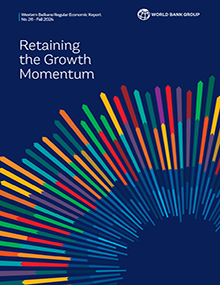www.worldbank.org/eca/wbrer
#WBRER
#WBRER

Press Release | Albanian | Bosnian | Macedonian | Serbian
Economic growth in the Western Balkans is expected to accelerate to 3.3 percent in 2024, up from 2.6 percent in 2023, supported by easing of price pressures and rising credit availability and resilient labor markets, which have resulted in increased consumption and investment on the demand side, together with growth in the construction and services sectors on the supply side. However, sluggish performance across key European trading and investment partners has limited external demand.
The region’s labor market saw further improvement in 2024, with employment reaching a historical high of 48.5 percent in June 2024, although still lower than the rate of 54.4 percent of the EU27. Between mid-2023 and mid-2024, an additional 114,000 jobs were created in the region.
Poverty reduction in the Western Balkans has continued a downward trend but at a slower pace than in the pre-pandemic period, from over 3 percentage points annually pre-pandemic to about 1 percentage point annually between 2022 and 2025.Recent wage increases in the region may not necessarily translate into increases in the welfare of households below the poverty line, often characterized by long-term unemployment or high levels of inactivity.
After three years of consolidation, fiscal deficits in the Western Balkans are expected to widen in 2024. Revenue performance remains robust across the region, with strong tax revenue growth, but expenditures are increasing, especially on social benefits and pensions, with a rebound in capital spending in some countries.
Growth in the Western Balkans is expected to increase moderately in the coming period. In terms of growth drivers, consumption and investment are expected to play a more significant role in supporting growth during the coming years, as export demand remains muted with import growth outpacing export growth.
The EU’s Growth Plan offers a combination of new financing opportunities and early access to selected aspects of the single market. An expansion of Single Euro Payments Area (SEPA) to some of the Western Balkan countries in 2025 would help support market integration and remove barriers to financial flows.
The spotlight in this edition of the Western Balkans Regular Economic Report focuses on migration and delves into how better managing the Western Balkans’ global workforce could be a driver of economic development in the region.
Nearly one in four people from the Western Balkans live abroad. While emigration may pose challenges—such as labor shortages, when managed effectively, migration can alleviate poverty, stimulate exports and attract investment, resulting in job creation and knowledge transfers.
This spotlight recommends policy action on four main fronts to reap the economic benefits of migration. First, develop skills training and mobility programs in partnerships with destination countries, and expand bilateral social security agreements. Second, enhance migrant protections throughout their migration journey to mitigate risks they may face and incentivize return. Third, facilitate the transfer of expertise, and cutting-edge technologies from members of the diaspora. Fourth, utilize digital tools and improve data collection for effective migration management and policymaking.
Albania | Bosnia and Herzegovina | Kosovo | Montenegro | North Macedonia | Serbia